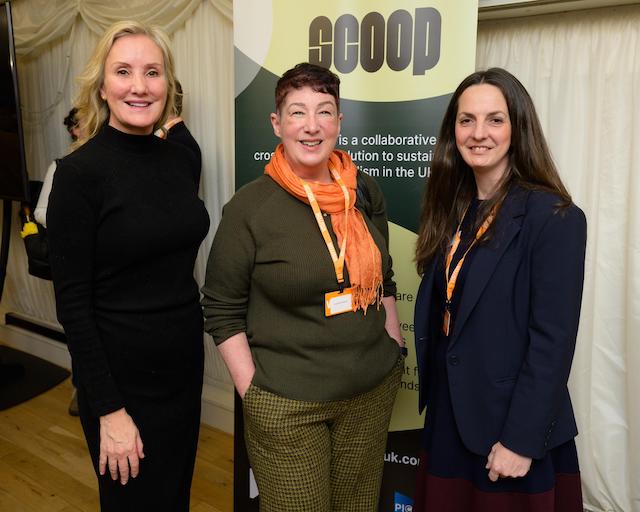Launch of SCOOP to help freelance journalists
New 'one-stop shop' set up to pay creators for secondary use of their work online

© Adrian Pope
NUJ president Natasha Hirst was one of the speakers at the launch of SCOOP, which aims to create a mechanism for freelance journalists and photojournalists so they get paid for the online secondary use of their work.
It is a new 'one-stop shop' joint venture between the non-profit licensing organisations representing freelance journalists and photojournalists – the Authors Licensing and Collecting Society (ALCS), the National Union of Journalists (NUJ), DACS and PICSEL – and was launched this week at the All-Party Writers Group reception at the House of Commons.
Culture, Media & Sport committee chair Caroline Dinenage and author Joanne Harris gave speeches, outlining the reasons behind why SCOOP is being launched.
It aims to develop mutually beneficial collective agreements between the representatives of freelance journalists and technology companies, who are securing commercial returns from the online secondary use of their works, such as “news scraping” or training for generative AI models.
SCOOP will:
- Sustain freelance journalism and pay creators for secondary uses of their work online.
- Facilitate collaboration between creators and technology companies.
- Fund projects to support, train and develop journalists particularly those from underrepresented backgrounds.
These voluntary partnership agreements would ensure that freelance journalists and photojournalists receive a fair share of the revenues generated.
Hirst told the audience the initiative is “desperately needed to provide the payment that freelances deserve and need to sustain their careers.”
She added: “We are talking about freelances like me and thousands more who are represented by the NUJ and organisations like ALCS, DACS and PICSEL. In my 15 years of freelancing as a photojournalist it has never been so difficult to make a living.
“Remember, freelances do not have holiday pay or sick pay. Many of us can't afford to pay into a private pension. Our safety online and in person is increasingly at risk and we have no employer to protect us. We are working in a context where many of our rates haven’t risen in well over a decade and on average freelance journalists earn less than the national living wage for the skilled work that we do.”
Hirst said it “is already impossible to identify and pursue most examples of copyright theft”, which has been “turbo charged by unauthorised ‘secondary uses of online content’ such as news scraping” and the use of content and images to train Large Language Models for generative AI.
She went on: “The NUJ’s position is clear, that we support the protection of rights holders and resist AI developers who violate copyright laws and use work without permission. It can never be acceptable for organisations to profit from the theft of creators’ work.
“But these thefts have already happened and they risk continuing without clear action to hold tech companies to account. Although some piecemeal agreements exist between publishers and tech companies for secondary use, they fail to address the rights that freelance journalists hold in their content.
“Recent analysis estimates the value of payments due to freelance journalists is in the hundreds of millions. This all sits within the wider context of fears about the impact of AI on journalism, both in terms of the production of quality and trusted journalism and on the ability of journalists of all backgrounds to continue working in the industry.”
Hirst concluded: “We present a practical and voluntary collective approach that is designed to operate within the existing regulatory environment. SCOOP will facilitate a collaboration between creators and technology companies.
“There is no other mechanism to develop collective agreements between the representatives of freelance journalists and those companies who are profiting financially from the online secondary use of their works. The mechanism will also support the training and development needs of freelances, especially those from under-represented backgrounds.
“We call on you for your support to protect freelances journalists and photojournalists and to help us build a fairer and more stable industry for us to work in.”
